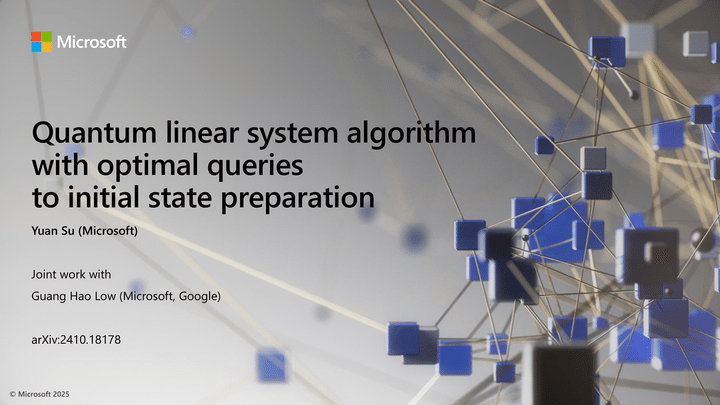Quantum linear system algorithm with optimal queries to initial state preparation (QIP 2025)

Abstract
Quantum algorithms for the linear system problem produce the solution $A^{-1}|b\rangle$ by querying two oracles: $O_A$ that block encodes the coefficient matrix and $O_b$ that prepares the initial state. We present a quantum linear system algorithm making $\mathbf{\Theta}(1/\sqrt{p})$ queries to $O_b$, which is optimal in the success probability, and $\mathbf{O}(\kappa\log(1/p)(\log\log(1/p)+\log(1/\epsilon)))$ queries to $O_A$, nearly optimal in all parameters including the condition number and accuracy. Notably, our linear cost scaling of initial state preparation holds even when $p$ is not known $\textit{a priori}$. This contrasts with recent results achieving $\mathbf{O}(\kappa\log(1/\epsilon))$ complexity to both oracles, which, while optimal in $O_A$, is highly suboptimal in $O_b$, as $\kappa$ can be arbitrarily larger than $1/\sqrt{p}$. In various applications such as solving differential equations, preparing ground states of operators with real spectra, and estimating and transforming eigenvalues of non-normal matrices, we can further improve the dependence on $p$ using a block preconditioning scheme to nearly match or outperform best previous results based on other methods, while also furnishing an extremely simple quantum linear system algorithm with an optimal query complexity to $O_A$. Underlying our results is a new Variable Time Amplitude Amplification algorithm with Tunable thresholds (Tunable VTAA), which fully characterizes generic nested amplitude amplifications, improves the $\ell_1$-norm input cost scaling of Ambainis to an $\ell_{\frac{2}{3}}$-quasinorm scaling, and admits a deterministic amplification schedule for the quantum linear system problem.